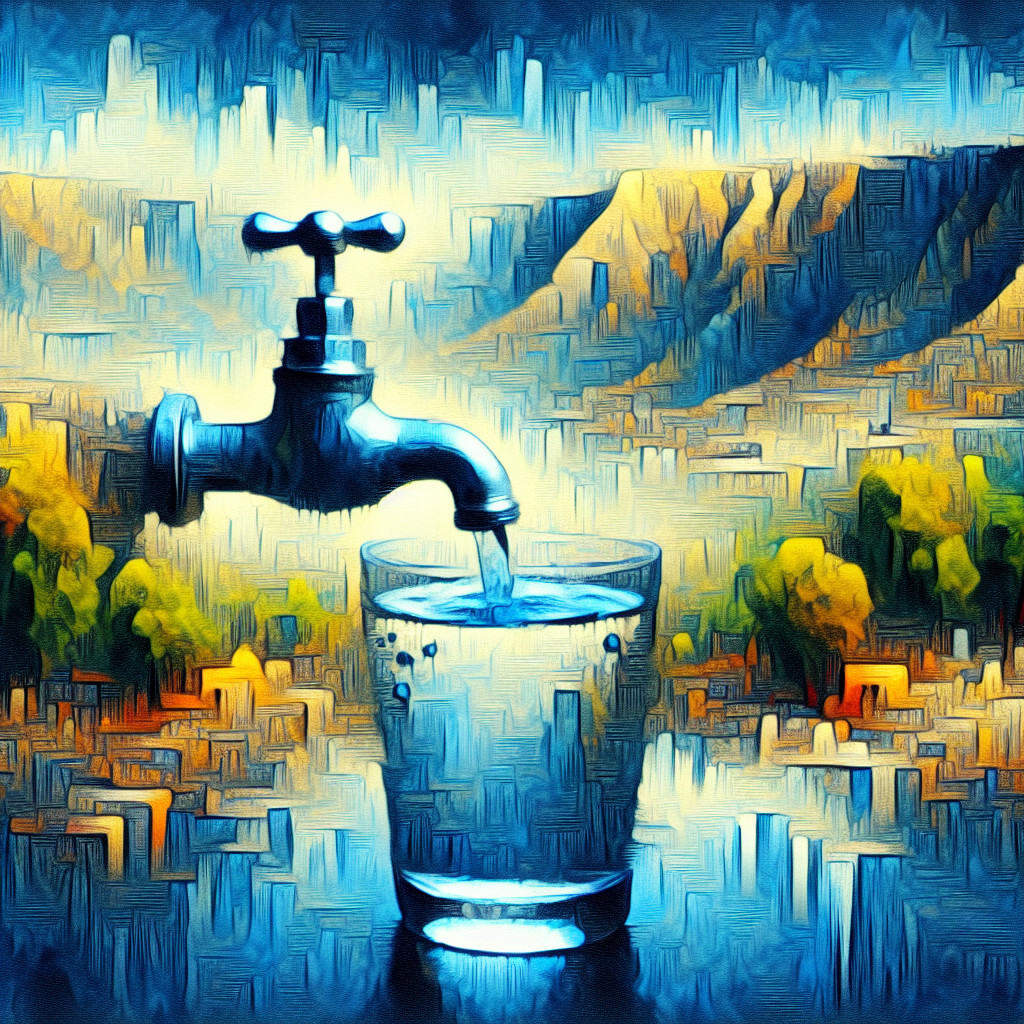-
Table of Contents
“Indonesia’s Tap Water: A Challenge in Quality and Accessibility.”
Introduction

Tap water in Indonesia is generally not considered safe to drink directly from the tap due to potential contamination with harmful bacteria, viruses, or chemicals. The country’s water infrastructure has faced challenges including pollution, inadequate sanitation, and inefficient treatment facilities. As a result, locals and visitors often rely on bottled water or use water purification methods before consumption. However, the government and various organizations are continuously working on improving the water quality and infrastructure.
Understanding the Quality of Tap Water in Indonesia
Indonesia, an archipelago nation with over 17,000 islands, is home to a diverse population of over 270 million people. Despite its abundant natural resources, the country faces significant challenges in providing clean, safe tap water to its residents. The quality of tap water in Indonesia varies greatly, depending on the region and the source of the water.
In urban areas, the tap water is typically supplied by the local water utility company, known as PDAM (Perusahaan Daerah Air Minum). PDAM is responsible for treating and distributing water to households, businesses, and other establishments. However, the quality of the water supplied by PDAM is often questionable. Many residents complain about the taste, smell, and color of the tap water, which is often murky or brownish due to the high iron content. Moreover, the water treatment process is not always effective in removing harmful bacteria and other contaminants, posing a risk to public health.
In rural areas, the situation is even more challenging. Many communities rely on untreated surface water or groundwater for their daily needs, including drinking, cooking, and bathing. These water sources are often contaminated with harmful substances, such as bacteria, viruses, heavy metals, and pesticides. The lack of access to clean, safe tap water in rural areas contributes to high rates of waterborne diseases, such as diarrhea, typhoid, and cholera.
The Indonesian government has made efforts to improve the quality of tap water in the country. For instance, it has launched several programs to expand the water supply network, upgrade the water treatment facilities, and promote the use of household water treatment systems. However, these efforts have been hampered by various challenges, including lack of funding, weak regulatory enforcement, and poor infrastructure.
Furthermore, climate change poses a significant threat to the quality of tap water in Indonesia. Rising temperatures, changing rainfall patterns, and increasing frequency of extreme weather events can affect the availability and quality of water resources. For instance, prolonged droughts can lead to water scarcity, while heavy rains can cause flooding and contamination of water sources.
Despite these challenges, there are reasons to be optimistic about the future of tap water in Indonesia. The country has made significant progress in increasing access to clean water over the past few decades. Moreover, new technologies, such as advanced water treatment systems and remote sensing tools, offer promising solutions to improve the quality of tap water.
In conclusion, the quality of tap water in Indonesia is a complex issue that requires concerted efforts from the government, private sector, and civil society. While significant challenges remain, there are also opportunities to make clean, safe tap water a reality for all Indonesians. As the country continues to develop and modernize, ensuring access to high-quality tap water will be crucial for promoting public health, reducing poverty, and achieving sustainable development.
The Impact of Pollution on Indonesia’s Tap Water
Indonesia, an archipelago nation with over 17,000 islands, is home to a population of more than 270 million people. Despite its abundant natural resources, the country faces a significant challenge in providing clean, safe tap water to its residents. The primary reason for this is the high level of pollution that affects the country’s water sources.
Indonesia’s rapid industrialization and urbanization over the past few decades have led to an increase in pollution, which has had a profound impact on the quality of its tap water. Industrial waste, agricultural runoff, and domestic sewage are the main contributors to water pollution in the country. These pollutants contain harmful substances such as heavy metals, chemicals, and pathogens, which can pose serious health risks when consumed through tap water.
The situation is further exacerbated by the lack of adequate wastewater treatment facilities in the country. A significant portion of the industrial and domestic waste generated in Indonesia is discharged directly into rivers and other water bodies without any treatment. This not only pollutes the water but also affects the aquatic life and the overall ecosystem.
The impact of pollution on Indonesia’s tap water is evident in the high incidence of waterborne diseases in the country. According to the World Health Organization, diarrheal disease is the second leading cause of death in Indonesian children under five, largely due to contaminated water. Moreover, long-term exposure to polluted water can lead to chronic health conditions such as kidney disease and cancer.
The quality of tap water varies significantly across different regions of Indonesia. In urban areas, where piped water supply is more common, the water is often treated before distribution. However, the treatment processes may not be sufficient to remove all pollutants, especially the chemical contaminants. On the other hand, in rural areas, where people often rely on wells or surface water for their daily needs, the water quality is generally poor due to the lack of treatment facilities and high levels of pollution.
The Indonesian government has taken several measures to address the issue of water pollution and improve the quality of tap water. These include stricter regulations on industrial waste discharge, investment in wastewater treatment infrastructure, and promotion of water purification technologies. However, these efforts have been hampered by various challenges such as lack of funding, weak enforcement of regulations, and low public awareness about water pollution.
In conclusion, the impact of pollution on Indonesia’s tap water is a serious issue that needs urgent attention. While the government’s efforts to tackle this problem are commendable, there is a need for a more comprehensive and integrated approach that involves all stakeholders. This includes not only the government and industries but also the communities and individuals who are the end-users of the water. By working together, it is possible to ensure that every Indonesian has access to clean, safe tap water, which is a fundamental human right.
The Role of Government in Ensuring Safe Tap Water in Indonesia
Indonesia, an archipelago nation with over 17,000 islands, is home to a population of more than 270 million people. Despite its abundant natural resources, access to clean and safe tap water remains a significant challenge for many Indonesians. The role of the government in ensuring safe tap water in Indonesia is therefore crucial, and it is a responsibility that is taken seriously.
The Indonesian government has made significant strides in improving the country’s water supply infrastructure. The Ministry of Public Works and Housing, for instance, has been at the forefront of these efforts, implementing various programs aimed at expanding access to clean water. These initiatives include the construction of new water treatment plants, the rehabilitation of existing facilities, and the expansion of water distribution networks.
However, despite these efforts, the quality of tap water in Indonesia varies greatly from one region to another. In urban areas, where water treatment facilities are more prevalent, tap water is generally safe for consumption. However, in rural areas, where access to such facilities is limited, the quality of tap water can be questionable. This disparity is largely due to the geographical challenges posed by the country’s archipelagic nature, which makes it difficult to establish and maintain water infrastructure in remote areas.
To address this issue, the government has been working to decentralize water management, transferring the responsibility for water supply from the central government to local governments. This approach allows for more localized solutions, taking into account the unique challenges and resources of each region. The government has also been promoting community-based water management, encouraging local communities to take an active role in managing their water resources.
Furthermore, the government has been investing in technology to improve water quality. This includes the use of advanced filtration systems and the introduction of water quality monitoring systems. These technologies not only help to ensure that tap water is safe for consumption, but also allow for real-time monitoring of water quality, enabling swift responses to any issues that may arise.
In addition to these efforts, the government has also been implementing regulations to protect water sources from pollution. The Indonesian Environmental Law, for instance, imposes strict penalties on activities that pollute water sources. The government has also been working to raise public awareness about the importance of protecting water resources, conducting campaigns and educational programs to promote responsible water use.
Despite these efforts, however, challenges remain. Ensuring access to safe tap water for all Indonesians is a complex task that requires not only significant investment in infrastructure and technology, but also a change in attitudes and behaviors towards water use and conservation. The government, therefore, continues to explore new strategies and partnerships to further improve the country’s water supply.
In conclusion, the role of the government in ensuring safe tap water in Indonesia is multifaceted, involving infrastructure development, regulatory enforcement, public education, and community engagement. While progress has been made, the journey towards universal access to safe tap water in Indonesia is ongoing. The government’s commitment to this cause, however, gives hope that this goal is within reach.
Health Implications of Consuming Tap Water in Indonesia
Indonesia, an archipelago nation with over 17,000 islands, is home to a diverse population of over 270 million people. Despite its rich natural resources, the country faces significant challenges in providing clean and safe tap water to its inhabitants. The quality of tap water in Indonesia varies greatly across the country, with many areas, particularly rural and remote regions, lacking access to treated water. This article will delve into the health implications of consuming tap water in Indonesia.
The primary concern with consuming tap water in Indonesia is the potential presence of harmful contaminants. The country’s water supply is often polluted with bacteria, viruses, and parasites due to inadequate sanitation and waste management systems. Consuming water contaminated with these pathogens can lead to a range of health issues, including diarrhoea, typhoid, and cholera. These waterborne diseases are a significant public health concern in Indonesia, contributing to high rates of illness and mortality, particularly among children.
In addition to biological contaminants, the tap water in many parts of Indonesia is also polluted with harmful chemicals. Industrial waste, agricultural runoff, and mining activities often contaminate the water supply with heavy metals such as lead, mercury, and arsenic. Long-term exposure to these chemicals through drinking water can lead to serious health problems, including neurological damage, kidney disease, and various types of cancer.
Furthermore, the high turbidity of tap water in many parts of Indonesia is another concern. Turbidity refers to the cloudiness or haziness of a fluid caused by large numbers of individual particles that are generally invisible to the naked eye. High turbidity can interfere with disinfection processes and provide a medium for microbial growth, increasing the risk of waterborne diseases.
The Indonesian government has made efforts to improve the country’s water quality and accessibility. However, these initiatives have been hampered by a lack of infrastructure, funding, and regulatory enforcement. As a result, many Indonesians rely on bottled water or water purification systems for their drinking water needs. However, these options are not always affordable or accessible for low-income households, further exacerbating health disparities.
In conclusion, the consumption of tap water in Indonesia carries significant health risks due to the potential presence of harmful biological and chemical contaminants. These risks underscore the urgent need for comprehensive and sustainable solutions to improve the country’s water quality and accessibility. While the government has made strides in this direction, much work remains to be done. In the meantime, it is advisable for residents and visitors to avoid drinking tap water in Indonesia unless it has been properly treated or purified. This precautionary measure can help prevent the health issues associated with consuming contaminated water.
Q&A
1. Question: Is tap water in Indonesia safe to drink?
Answer: No, tap water in Indonesia is generally not considered safe to drink due to potential contamination with bacteria, viruses, and certain chemicals.
2. Question: How do locals in Indonesia consume water?
Answer: Locals in Indonesia typically consume bottled water or boil tap water before drinking to kill any harmful bacteria or viruses.
3. Question: What is the quality of tap water in Indonesia?
Answer: The quality of tap water in Indonesia varies greatly depending on the region. In many urban areas, the tap water is heavily chlorinated, while in rural areas, it may be contaminated with bacteria or other pollutants.
4. Question: Are there efforts to improve the tap water quality in Indonesia?
Answer: Yes, the Indonesian government and various international organizations are working to improve the country’s water infrastructure and sanitation systems to provide clean and safe drinking water.
Conclusion
The quality of tap water in Indonesia is generally poor and not safe for direct consumption due to contamination with bacteria, viruses, and heavy metals. It is recommended to boil or filter the water before drinking.






